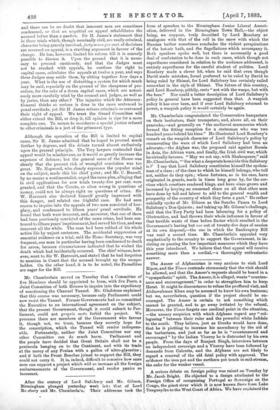Although the operation of the Bill is limited to capital
cases, Sir H. James admitted that he hoped to proceed much further by degrees, and the debate turned almost exclusively upon the general principle. The Tory lawyers contended that appeal would be mischievous, as it would so greatly increase the expenses of defence ; but the general sense of the House was clearly that the present risk of wrongful conviction was too great. Mr. Hopwood, who closely expresses the popular mind on the subject, made this his chief point; and Mr. C. Russell, by no means a sentimentalist, urged the same plea, alleging that in civil applications for new trials twenty-five per cent. were granted, and that the Courts, so often wrong in questions of money, could not be always right on questions of crime. Sir W. Harcourt also 'declared himself greatly impressed with this danger, and related one frightful case. He had seen reason to inquire into the appeals of two men convicted of bur- glary, and condemned to fifteen years' penal servitude. He found that both were innocent, and, moreover, that one of them had been previously convicted of the same crime, had been sen- tenced to fifteen years' imprisonment,had served his time, and was innocent all the while. The man hal been robbed of his whole active life by unjust sentences. The accidental suppression of essential evidence on a trial, said the Home Secretary, was very frequent, one man in particular having been condemned to death for arson, because circumstances indicated that he wished the death which had incidentally occurred. The chief witness, how- ever, went to Sir W. Harcourt, and stated that he had forgotten to mention in Court that the accused brought up the escape- ladder. On the other hand, it is to be noted, the Parnellites are eager for the Bill.


































 Previous page
Previous page